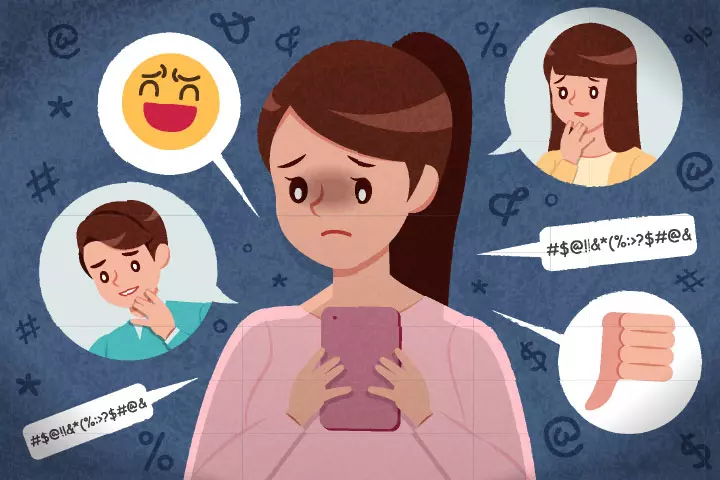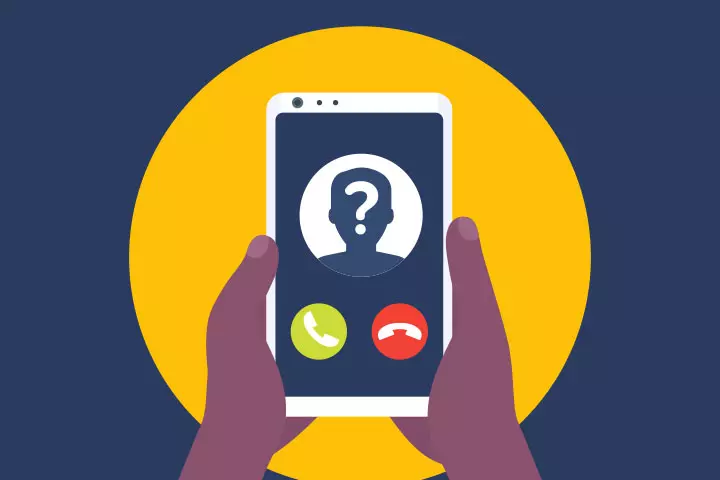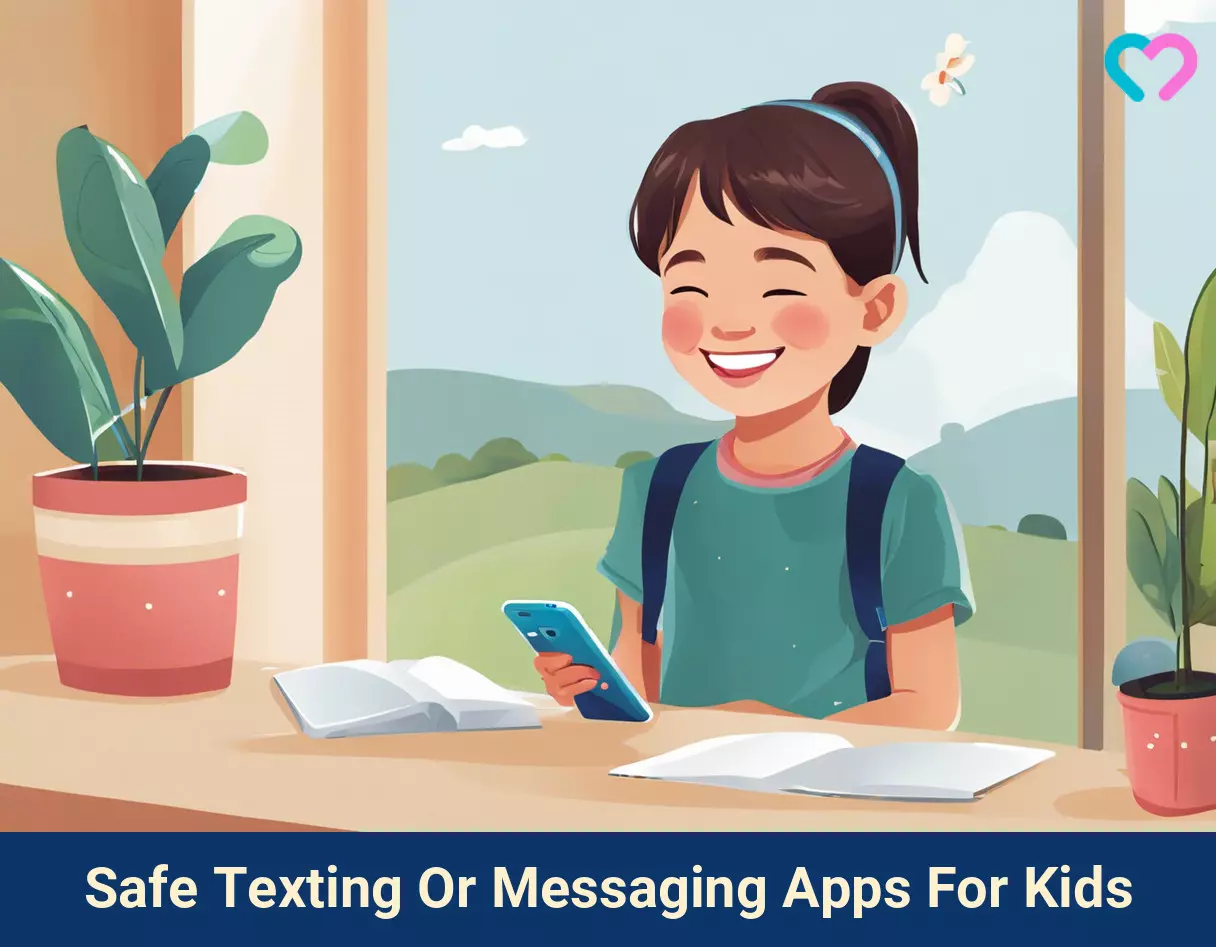
Image: Shutterstock
In today’s world, where every person is in the grip of technology, messaging apps for kids are indispensable. The internet is important in our lives, but it comes with safety challenges. Parents cannot ask children to stay away from the internet, but they must ensure their safety while using it. Messaging apps protect children from online threats by offering features that encourage safe interactions. Although it is impossible to protect them completely, children’s messaging apps help parents monitor their text and exercise some control over the usage. Read the post to learn about the best messaging app for kids and their safety measures.

Key Pointers
- Parents should help children pick the right texting mobile apps to keep them safe on the internet.
- Share the dos and don’ts to remember when texting through apps.
- Instagram, Facebook Messenger, and Google Hangouts are some popular and safe apps for children.
Why Parents Should Help Kids Choose A Texting App
Parents should be aware of the effects of mobile phones on kids. It’s important to know what they are doing on these devices to guide them on proper usage and figure out the difference between good and bad content. If you are worried about your child getting unwanted messages, you can give them another device in lieu of a phone, at least until they reach middle school. Mother and writer Anastasia Basil shares how she overcame the issue of giving her nine-year-old daughter a phone. She says, “I bought her a Gizmo Gadget watch. I call her, she calls me. I can text and send reminders from my smartphone to her watch, for which I pay a monthly fee of $5. She can text back limited characters. She can also leave me voice messages (i).” However, if you plan to give a phone to your child, then you can check various messaging apps before downloading them. Here are a few points to keep in mind when selecting a messaging app for kids.
- Contact from strangers: Pick platforms that offer parental control over messages from unknown numbers as connecting with strangers might not be safe.
- Sexting: Teens may end up sending or receiving inappropriate content, which could cause mental and emotional harm.
- Grooming: With no supervision of their connections through messaging, children could become susceptible to grooming.
- Cyberbullying: Children may get involved in cyberbullying or get harassed by others if not adequately supervised.

It is essential for parents to actively engage in their children’s app usage, have open discussions about the app’s features, and explain the reasons behind certain safety measures. This helps children understand the importance of these tools and promotes their awareness of online safety.
Why You May Want Your Child To Use Kids’ Messaging Apps
Today, communication is primarily digital rather than face-to-face, making chat apps essential, even for children. Unlike regular texting apps, chat apps for children come with various benefits. Here are some reasons why your child should have a messaging app:
- Independence: Chatting apps for kids give them the freedom to connect with their friends and express themselves without their parent’s direct involvement.
- Safety: There are various safety features available to protect children from being contacted by strangers or becoming involved in threatening situations.
- Parental controls: Based on the children’s needs, parents can control the app to protect them from harassment and cyberbullying.
- Peace of mind: These apps provide peace of mind for parents as their children are protected from online threats.

Safety Measures To Take While Using A Messaging App
Using a messaging app for your child and family can lead to sharing a lot of personal information. Therefore, before downloading and using one, it’s vital to keep the following safety precautions in mind.
- Don’t share real names on social media apps or sync the device’s address book with the app as it could jeopardize privacy and lead to online threats.
- Always set secure privacy settings and instruct children not to accept messages or calls from unknown people or people who are not on their contact list.
- Disable the location feature in the privacy settings.

 Quick tip
Quick tip- Instruct your children to seek permission before making or receiving a voice or video call to ensure privacy.
- Supervise children closely in the initial stage of using a messaging app.
- Ask your child to use their device in common areas of the home and not in the bedroom or study room for better monitoring.
- Have an open conversation with children about using the texting app responsibly and safely.
- Encourage your child to share anything they experience while using the app, especially if they encounter uncomfortable conversations or interactions.
How To Choose A Messaging App For Kids
The online market is full of messaging apps, and with such a vast range of choices, making the right choice can get challenging. Here are some features you should consider when choosing a messaging app for your children:
- Age relevance: Many messaging apps are created specially for children and families. These apps contain only age-appropriate features and do not offer open chat rooms. When considering apps for children under 13, ensure they comply with COPPA (Children’s Online Privacy Protection Act).
- Parental controls: Messaging apps for children should have complete parental control. Only parents should have the authority to approve and manage contacts. They should also be able to monitor all chats and be alerted to suspicious content.
- Privacy: Look for apps that offer end-to-end encryption to protect conversations. Avoid apps that collect, store, or share data without consent. Apps without ads give a safer experience.
- Ease of use and additional features: Apps with an easy-to-navigate interface are a good choice as children not well-versed with messaging in apps can also easily use them. Many apps offer additional features beyond basic messaging, such as interactive video calls, games, and drawing tools, providing a more engaging and enjoyable experience.
- Cost: Some apps are free with limited features, while some require a one-time purchase or a monthly fee. Based on your budget, choose an app that would give you maximum features at the best possible price.
- Compatibility: Consider apps that are compatible with your child’s device. Some apps support family sharing and allow multiple children to use one account. So, consider apps that enable cross-platform messaging.
17 Kid-Friendly Texting Apps
Children can’t use just any messaging app that is popular with adults. Instead, they need an app with safety features that protect them from unwanted people and content. Here are some kid-friendly messaging apps you may explore:
1. Facebook Messenger Kids
It works like the regular Facebook Messenger app but includes features specifically for children, such as child-friendly stickers, frames, emojis, and GIFs. They can also make video calls using fun masks. It is a safe messaging app that allows taking photos and videos with filters and features parental control settings for approving and removing contacts.
Get the app here: iOS and Android
2. Kinzoo
An app with a cute name, Kinzoo, is designed for kids and families. It does not collect user data or display ads and gives its users complete privacy. Strangers cannot contact a child through this app, as only the contacts approved by parents can communicate with them. Also, it has no in-app purchases.
Get the app here: iOS and Android
3. Zoom
Zoom has rebranded its platform to ‘Zoom Workplace,’ emphasizing an AI-first, open collaboration environment. It is one of the most popular video conferencing apps that lets you invite up to 100 people. Though it is designed for conducting meetings, conferences, and classes, it makes a safe app for children to chat with their friends and enjoy group chats, and online classes. The free version of the app offers sufficient features for chatting. You can add a password to prevent unknown people from joining your meeting.
Get the app here: iOS and Android
4. Skype
Skype is a video chatting app with various features to protect your child. Only people on the contact list can contact your child. You can hide the profile details such as gender, age, and birth date. Moreover, your child’s profile will not show up on the search results unless the name matches the search.
Get the app here: iOS and Android
 Did you know?
Did you know?5. FaceTime
FaceTime is a pre-installed video call and chat app on iPads, Mac laptops, and iPhones. It allows hassle-free, no cost chatting with family and friends over the internet. Children can still receive calls on the device even when FaceTime is not running, making it an excellent app for emergencies. It works only on Apple devices.
Get the app here: iOS
6. Caribu
This app has several educational activities and is designed exclusively for family-friendly video calls. Parents have complete control over the contacts added to the app, so children can only interact with trusted family members and friends approved by parents. Also, it is COPPA-compliant (Children’s Online Privacy Protection Act), ensuring high privacy standards.
Get the app here: iOS and Android
7. Gabb Messenger
From video chats to regular text messages, this app offers all chatting features within a safe environment for children. Parents can manage who their child talks to, ensuring only approved contacts can send messages. They can also decide which messages their child can delete or keep. Plus, the app has a smart filter that monitors video calls for any potential risks, ensuring complete safety of kids.
Get the app here: iOS and Android
8. GoTalk Now
This video chat tool is designed for desktops and mobiles. Share the chat link with your family members or friends to enjoy a conference call. It is also an easy-to-use app for grandparents and younger children who are unfamiliar with technology. It also assists individuals with speech and communication challenges, including children with special needs. Designed to work on Mac, Android, and Windows, it makes a convenient and safe option for children to have a video chat.
Get the app here: iOS
9. Animal Jam

You do not need parent approval to create an account on Animal Jam, but you can access free parental controls by registering your email address. It uses human monitors and filters to keep track of iffy conversations. You can also select from three different chat levels that include pre-approved phrases and open chats. The app does not allow limiting chatting to only friends.
Get the app here: iOS and Android
10. Fennec Messenger
Suitable for all ages, this app has a simple, child-friendly interface that is easy to navigate. It is safe for children to use as parents are required to approve every contact before a child can communicate. Also, all messages are end-to-end encrypted, so there is no need to worry about privacy and security. Furthermore, the app does not contain ads or tracking, which ensures children are away from external influences.
Get the app here: iOS and Android
11. Cantina
Designed for Android and iOS, the Cantina (formerly Airtime app) offers good entertainment and allows sharing photos, listening to music, and watching TV shows with friends. It lets children chat and watch videos at the same time. It even allows parents to create a private room for chatting. Customizing screens using animated stickers makes it a fun app for kids.
Get the app here: iOS and Android
12. Roblox
Roblox is a popular app with over 90 million monthly users. It has stronger filters for players younger than 12 years of age. To limit conversation, messaging and friending options can be turned off. The app also allows parents to create a PIN code that must be entered to change the settings. It has also introduced content labels, enabling parents to manage the content their children access.
Get the app here: iOS and Android
13. Tocomail
A safe mailing app for children, this app has a chat feature designed especially for its young users. It offers strong parental controls, which include email monitoring and filtering. It also has special color-coded inboxes to help kids identify safe messages. Its spam filtering features ensure unwanted and inappropriate messages are blocked.
Get the app here: iOS and Android
14. Stars Messenger
This app is designed for kids to chat with family and friends while being monitored by parents. It focuses on safety, ensuring they can only communicate with approved contacts. With a user-friendly interface and engaging features, it helps children stay connected with their loved ones in a secure environment.
Get the app here: iOS and Android
15. Whereby
Whereby is an easy-to-setup and user-friendly app for desktops and makes a convenient communication app for families. The free version comes with limited features and makes an ideal choice for daily video calls and chats. YouTube integration and fun emojis make the interaction more engaging for children. Parents can lock the room to keep strangers from joining their children.
Get the app here: Whereby
16. GroupMe
The app is available to Android and iOS users and can be a good option for kids and teens to stay in touch. The app may be used to chat, host polls, and share photos and events. Though traditional parental controls do not apply to this app, parents may block anyone if they don’t want them to share information with their children.
Get the app here: iOS and Android
17. JusTalk Kids
The app allows messaging plus video calling and keeps the user securely connected with family and friends. It has a simplified, child-friendly interface with prominent privacy and security features. For example, it allows parents to manage contacts and monitor their child’s interactions.
Get the app here: iOS and Android
Frequently Asked Questions
1. Should parents have access to their child’s text messages?
Although it may not be favorable to check your child’s text messages all the time, you may do so only when you suspect something is wrong. Moreover, if your child is too young to understand what is safe and what isn’t, you may help them by reinforcing the safety rules of texting and guiding them until they are responsible enough to safely use text messages and texting apps.
2. Why shouldn’t parents look through their child’s phone?
Unless you have facts to prove that your child is into something that isn’t age-appropriate on their phone, it is not advisable to check their phone often, especially at high-school age. Moreover, it may lead to privacy invasion, miscommunications, conflicts, and trust issues with your child. Once the trust factor is lost in the parent-child relationship, it isn’t easy to regain it.
3. What age range is appropriate for using a messaging app for kids?
The appropriate age range for using a messaging app for kids can vary depending on factors such as the specific app, parental guidance, and individual maturity levels. These apps often have built-in safety features and parental controls to ensure a safer digital environment for young users. Parents need to assess the specific app’s features, privacy settings, and age recommendations while also considering the effects of social media on children and whether or not their child is responsible enough before allowing them to use a messaging app.
Messaging apps can expose your children to inappropriate content or cyberbullying. An ideal messaging app for kids provides safety from online threats while giving children the freedom to connect with their friends. While selecting such an app, parents should ensure that it has some parental control features to help them monitor the content and the child’s online friends. Nevertheless, avoid sharing real names, permission to access the phone address book, or location, for security reasons. Encourage your child to share any untoward experience with you immediately. Using secure apps in moderation will keep your child safe from online predators.
Infographic: Safety Measures For Children Using A Messaging App
The use of messaging apps is on the rise these days. If you are a parent going through the initial stages of introducing your child to a messaging app and letting them use it, there are a few things you need to warn them about to ensure their safety online. In the following infographic, we have prepared a list you can share with your little ones.
Some thing wrong with infographic shortcode. please verify shortcode syntax
Illustration: Safe Texting Or Messaging Apps For Kids

Image: Stable Diffusion/MomJunction Design Team
Facebook has just launched a new Messenger App for Kids, giving parents more control over their children’s online conversations. Check out this video to learn more about this interesting app!
Personal Experience: Source
MomJunction articles include first-hand experiences to provide you with better insights through real-life narratives. Here are the sources of personal accounts referenced in this article.
i. What I gave my kid instead of a smartphone.https://humanparts.medium.com/what-i-gave-my-kid-instead-of-a-smartphone-27c0f028ea78
Community Experiences
Join the conversation and become a part of our nurturing community! Share your stories, experiences, and insights to connect with fellow parents.
Read full bio of Dana Sciullo
Read full bio of Bharathi V
Read full bio of Harshita Makvana
Read full bio of Kavita Kankani


















